This article was co-authored by Rebecca Levy-Gantt, MPT, DO. Dr. Rebecca Levy-Gantt is a board certified Obstetrician and Gynecologist running a private practice based in Napa, California. Dr. Levy-Gantt specializes in menopause, peri-menopause and hormonal management, including bio-Identical and compounded hormone treatments and alternative treatments. She is also a Nationally Certified Menopause Practitioner and is on the national listing of physicians who specialize in menopausal management. She received a Masters of Physical Therapy from Boston University and a Doctor of Osteopathic Medicine (DO) from the New York College of Osteopathic Medicine.
There are 10 references cited in this article, which can be found at the bottom of the page.
wikiHow marks an article as reader-approved once it receives enough positive feedback. In this case, 83% of readers who voted found the article helpful, earning it our reader-approved status.
This article has been viewed 2,131,127 times.
People experience a range of symptoms during their periods: cramps, bloating, constipation, headaches, and mood swings. Watching someone close to you go through this can make you feel helpless, but there are some things you can do to make them feel better. Tackle some of their physical symptoms first by offering over-the-counter medications and fiber-rich foods. Then be there for them emotionally by being kind, supportive, and helpful around the house.
Steps
Relieving Their Physical Symptoms
-
1Give them ibuprofen or aspirin. People can experience painful cramps during their periods, and ibuprofen or aspirin can help reduce the discomfort. If they don't already have some, go to a drugstore and pick up a bottle of their preferred pain reliever. Ask them if they want any, and if they say no, just leave it on a kitchen counter where they'll see it later.[1]
- They can either take 400 mg of ibuprofen or 600 mg of aspirin every four to six hours as needed.
-
2Offer them a heating pad. If they prefer natural remedies over medication, give them a heating pad to place over their lower abdomen to ease cramps. You can purchase disposable heating pads at the drugstore, or make a reusable one by filling a sock with rice and tying off the end.[2]
- Heat the sock-filled rice for one to two minutes in the microwave.
- Homemade heating pads shouldn't be left on for more than 30 minutes at a time, but store-bought disposable heating pads can often be left on for up to eight hours.
Advertisement -
3Pick out fiber-rich foods. People can sometimes become constipated while menstruating, so cook her food or offer her snacks that have lots of fiber in them. Offer her raspberries, pears, broccoli, lentils, brown rice, and whole grain cereals, but don’t insist they eat them if they don't want to. If they're craving more carb-heavy foods, make them a whole grain waffle with sliced fruit on top.[3]
-
4Steer clear of salty foods and alcohol. Some foods will make dehydration, bloating, and other period symptoms worse. If you're the one cooking or shopping, avoid picking up alcohol or salty foods like potato chips or french fries unless the person asks for them. Make sure to have plenty of healthy food options available. [4]
-
5Encourage them to drink more water. Dehydration can make abdominal cramps worse, so make sure they always have water within reach. Refill their water bottle when you see it getting low, or just fill up a glass and place it on a coffee or side table before sitting down to watch TV together.[5]
-
6Give them a massage. Offering them a back rub or a foot massage will help relieve some of their bodily aches while also showing that you still want to be near them. Ask if they'd like a massage, but don’t be offended if they say no. They may simply not want to be touched for a while.[6]
-
7Go on a walk together. While they may not feel like exercising, physical activity can actually reduce many symptoms of PMS. Rather than suggesting they go to the gym, ask if they'd like to go for a walk with you.[7]
Being Emotionally Supportive
-
1Be mature about their symptoms. Don’t make jokes about their behaviors and symptoms, and don’t make it obvious if menstruation makes you uncomfortable. They may want to talk about what they're going through, or they might not. Wait for them to bring it up, and if they do, be mature throughout the conversation, asking questions about their symptoms only as they relate to their well-being.[8]
- Listen to any complaints they have about their period, and then tell them you’re sorry they have to go through this.
- If you also menstruate, you can support your partner by sharing what helps you personally during those rough weeks. Try not to make the conversation all about you; instead, focus on how to make your partner feel better.
- Never use words like “crazy” or “insane” to describe their behaviors during this time. They may be more emotional due to hormone shifts, but they are no less intelligent or rational than they were before.
-
2Ask them if they want to be alone. During various points throughout the week, they may want to curl up with you on the couch, or they may want to be home alone. Don’t assume you know what they want. Ask in a nonjudgmental tone if they just want some space for a day or two. If not, stick around as much as possible so they don't feel isolated.[9]
- If they do want to be alone, respect their wishes. But also show them you’re still thinking about them by sending them a sweet text or email while you’re apart.
-
3Reduce social activities. They likely won’t be in the mood to socialize much when they're on their period, so don’t pressure them into going out with you during this time. Instead, order their favorite take-out and watch a movie together at home. If they're more tired than usual, suggest you both go to bed early.[10]
- If you’re close enough to be able to keep track of their cycle, avoid planning any big activities or events around the week of their period. Camping or beach trips should be avoided, as should fancy events where they'll need to get dressed up.
-
4Take on more household chores and errands. If their menstrual cramps are severe, they may not be physically able to do much around the house. Pick up the slack by washing dishes, doing laundry, buying groceries, cooking, and keeping things tidy. Even if they're not in a lot of pain, seeing you do these things will make them feel loved and appreciated.[11]
-
5Compliment her. People often feel bloated and unattractive during menstruation. A few compliments can go a long way toward making them feel more confident. Don’t overdo it by gushing about how great they look, but find little ways to slip compliments in.
- For example, if a sappy commercial on TV makes them cry, tell them you love how kind and caring they are.
- If they don't want to go out, tell them how relaxing it is to stay home with them.
-
6Be patient. This can be a tough time both for them and for you. Don’t lose your temper if you think they're being unreasonable, and don’t run for the hills because you want to avoid it altogether. Take deep breaths when they're behaving in a way you don’t understand, and know that it will pass. Most periods only last between three and five days, but for some people it can last up to a week.[12]
- Practice meditation once or twice a day to help calm any frustration you may be feeling.
Expert Q&A
-
QuestionWhat should you not say to a girl on her period?
 Rebecca Levy-Gantt, MPT, DODr. Rebecca Levy-Gantt is a board certified Obstetrician and Gynecologist running a private practice based in Napa, California. Dr. Levy-Gantt specializes in menopause, peri-menopause and hormonal management, including bio-Identical and compounded hormone treatments and alternative treatments. She is also a Nationally Certified Menopause Practitioner and is on the national listing of physicians who specialize in menopausal management. She received a Masters of Physical Therapy from Boston University and a Doctor of Osteopathic Medicine (DO) from the New York College of Osteopathic Medicine.
Rebecca Levy-Gantt, MPT, DODr. Rebecca Levy-Gantt is a board certified Obstetrician and Gynecologist running a private practice based in Napa, California. Dr. Levy-Gantt specializes in menopause, peri-menopause and hormonal management, including bio-Identical and compounded hormone treatments and alternative treatments. She is also a Nationally Certified Menopause Practitioner and is on the national listing of physicians who specialize in menopausal management. She received a Masters of Physical Therapy from Boston University and a Doctor of Osteopathic Medicine (DO) from the New York College of Osteopathic Medicine.
Board Certified Obstetrician & Gynecologist Don't make jokes about her being on her period or dismiss her feelings because she's on her period. Unless she brings up the fact that she's on her period, don't mention it or ask her questions about it.
Don't make jokes about her being on her period or dismiss her feelings because she's on her period. Unless she brings up the fact that she's on her period, don't mention it or ask her questions about it.
References
- ↑ http://www.mayoclinic.org/diseases-conditions/premenstrual-syndrome/basics/treatment/con-20020003
- ↑ https://health.thefuntimesguide.com/microwave-heading-pad/
- ↑ http://www.health.com/health/gallery/0,,20665964,00.html#help-i-always-get-diarrhea-during-my-period--0
- ↑ http://www.mayoclinic.org/diseases-conditions/premenstrual-syndrome/basics/lifestyle-home-remedies/con-20020003
- ↑ http://www.marieclaire.com/beauty/news/a23289/how-to-feel-better-during-your-period/
- ↑ http://www.newlovetimes.com/9-easy-ways-to-support-your-partner-during-her-menstruation/
- ↑ http://www.mayoclinic.org/diseases-conditions/premenstrual-syndrome/basics/lifestyle-home-remedies/con-20020003
- ↑ Rebecca Levy-Gantt, MPT, DO. Board Certified Obstetrician & Gynecologist. Expert Interview. 3 April 2020.
- ↑ http://www.telegraph.co.uk/men/thinking-man/men-heres-a-guide-on-how-to-behave-around-your-partner-when-shes/

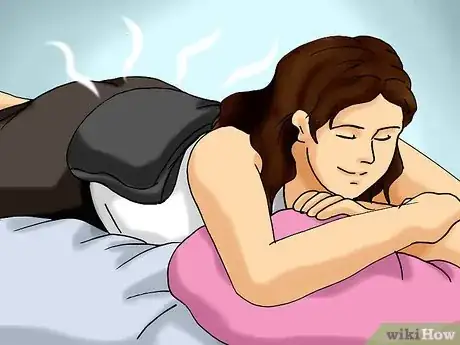
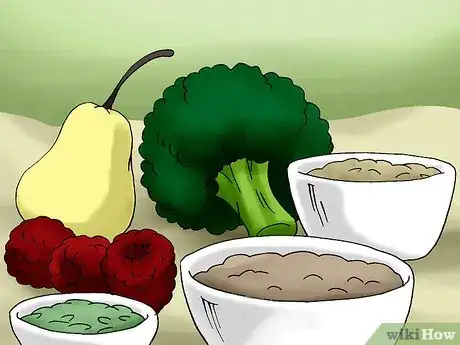
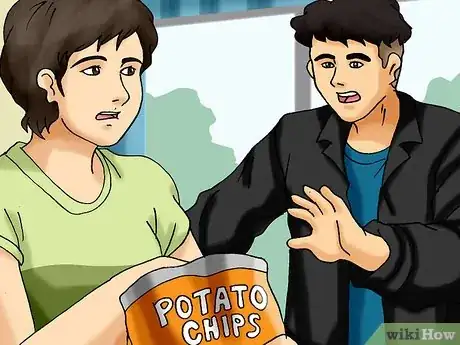
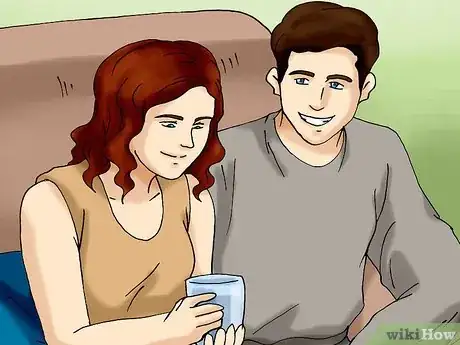
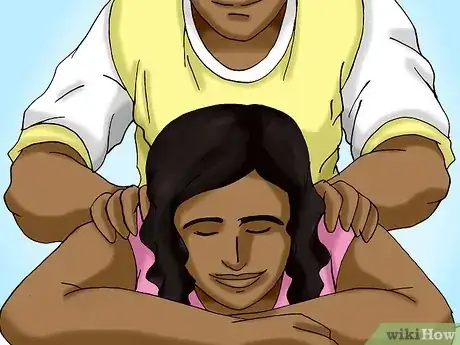

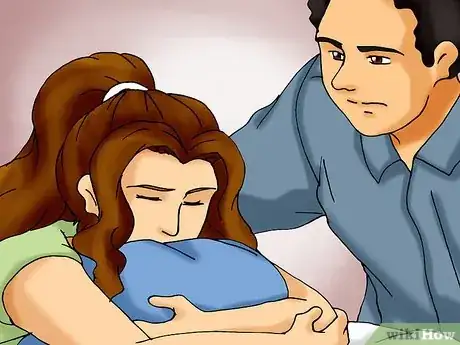


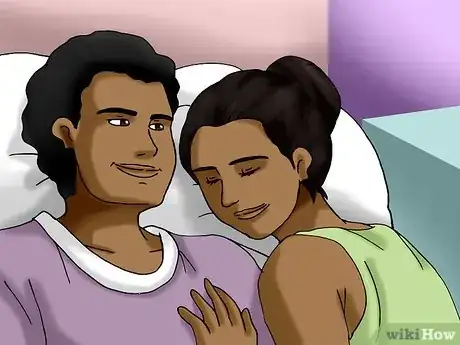

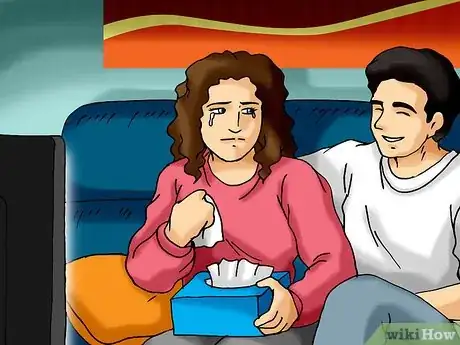

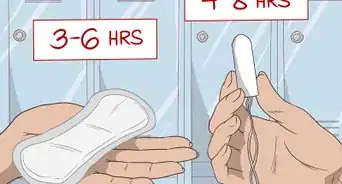

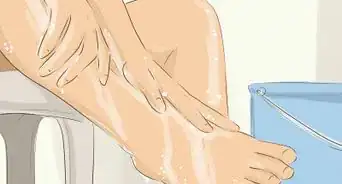



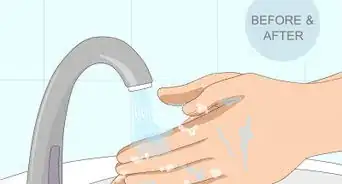

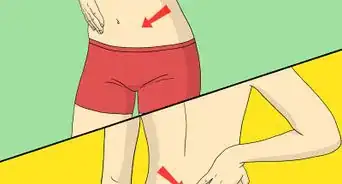




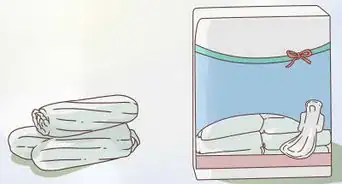











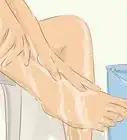




































Medical Disclaimer
The content of this article is not intended to be a substitute for professional medical advice, examination, diagnosis, or treatment. You should always contact your doctor or other qualified healthcare professional before starting, changing, or stopping any kind of health treatment.
Read More...